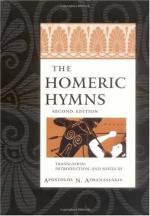The method of translation is that adopted by Professor Butcher and myself in the Odyssey, and by me in a version of Theocritus, as well as by Mr. Ernest Myers, who preceded us, in his Pindar. That method has lately been censured and, like all methods, is open to objection. But I confess that neither criticism nor example has converted me to the use of modern colloquial English, and I trust that my persistence in using poetical English words in the translation of Greek poetry will not greatly offend. I cannot render a speech of Anchises thus:—
“If you really are merely a mortal, and if a woman of the normal kind was your mother, while your father (as you lay it down) was the well- known Otreus, and if you come here all through an undying person, Hermes; and if you are to be known henceforward as my wife,—why, then nobody, mortal or immortal, shall interfere with my intention to take instant advantage of the situation.”
That kind of speech, though certainly long-winded, may be the manner in which a contemporary pastoralist would address a Goddess “in a coming on humour.” But the situation does not occur in the prose of our existence, and I must prefer to translate the poet in a manner more congenial, if less up to date. For one rare word “Etin” ([Greek text]) I must apologise: it seems to me to express the vagueness of the unfamiliar monster, and is old Scots, as in the tale of “The Red Etin of Ireland.”
THE HYMN TO APOLLO
The Hymn to Apollo presents innumerable difficulties, both of text, which is very corrupt, and as to the whole nature and aim of the composition. In this version it is divided into two portions, the first dealing with the birth of Apollo, and the foundation of his shrine in the isle of Delos; the second concerned with the establishment of his Oracle and fane at Delphi. The division is made merely to lighten the considerable strain on the attention of the English reader. I have no pretensions to decide whether the second portion was by the author of the first, or is an imitation by another hand, or is contemporary, or a later addition, or a mere compilation from several sources. The first part seems to find a natural conclusion, about lines 176-181. The blind singer (who is quoted here by Thucydides) appears at that point to say farewell to his cherished Ionian audience. What follows, in our second part, appeals to hearers interested in the Apollo of Crisa, and of the Delphian temple: the Pythian Apollo.




